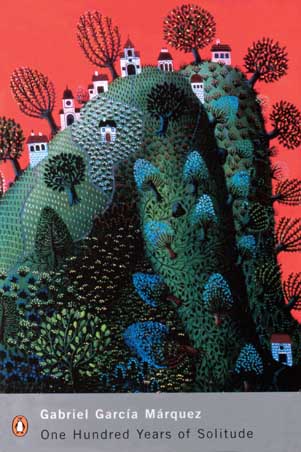Our book group choice for February 2005 is One Hundred Years of Solitude by Gabriel Garcia Marquez. First published in 1967, it is considered one of the most important works of Latin American literature and has been translated into over 35 languages.
The novel tells the story of the Buendía family, who found and inhabit the town of Macondo. The story spans seven generations of the Buendías and covers a period of over 100 years.
The novel is set in a fictional town called Macondo, which is located in the Colombian jungle. Macondo is a magical place where the impossible is possible. The town is founded by José Arcadio Buendía and his wife, Úrsula Iguarán. José Arcadio Buendía is a visionary who dreams of creating a perfect society. Úrsula Iguarán is a practical woman who helps her husband to build Macondo.
The Buendía family is cursed with a cycle of solitude. Each generation of the family is marked by isolation and loneliness. The family members are also plagued by violence and misfortune. Despite the hardships they face, the Buendías continue to build Macondo and to create a life for themselves.
One of the most important characters in the novel is Aureliano Buendía, a military leader who fought in the Colombian civil wars. Aureliano Buendía is a complex and contradictory character. He is a brilliant strategist and a ruthless killer. He is also a sensitive and compassionate man who is deeply affected by the violence of war.
Another important character in the novel is Melquíades, a mysterious gypsy who visits Macondo several times. Melquíades is a scholar and a magician. He brings new technologies to Macondo, such as ice and telescopes. He also teaches the Buendías about the occult and the supernatural.
One Hundred Years of Solitude is a rich and complex novel that explores the themes of love, loss, family, and history. The novel is a masterpiece of magical realism, a genre that blends realism with fantasy. The novel has been praised for its originality, its humor, and its insights into the human condition.
and tawdry story of the family, one sees all of humanity, just as in the history, myths, growth, and decay of Macondo, one sees all of Latin America.
Love and lust, war and revolution, riches and poverty, youth and senility — the variety of life, the endlessness of death, the search for peace and truth — these universal themes dominate the novel. Whether he is describing an affair of passion or the voracity of capitalism and the corruption of government, Gabriel Garcia Marquez always writes with the simplicity, ease, and purity that are the mark of a master.
Alternately reverential and comical, One Hundred Years of Solitude weaves the political, personal, and spiritual to bring a new consciousness to storytelling. Translated into dozens of languages, this stunning work is no less than an accounting of the history of the human race
Discussion Questions
- What kinds of solitude occur in the novel (for example, solitude of pride, grief, power, love, or death), and with whom are they associated? What circumstances produce them? What similarities and differences are there among the various kinds of solitude?
- What are the purposes and effects of the story’s fantastic and magical elements?
- Why does Garcia Marquez make repeated use of the “Many years later” formula? In what ways does this establish a continuity among past, present, and future? What expectations does it provoke? How do linear time and cyclical time function in the novel?
- What varieties of love occur in the novel? Does any kind of love transcend or transform the ravages of everyday life, politics and warfare, history, and time itself?
- What is the importance of the various inventions, gadgets, and technological wonders introduced into Macondo over the years? Is the sequence in which they are introduced significant?
- What is Melquiades’s role and that of his innovations, explorations, and parchments?
- When and how do politics enter the life of Macondo? With what short-term and long-term consequences?
- What did you think of how gender roles were represented? What characteristics do the men share? What characteristics do the women share?
- What dreams, prophecies, and premonitions occur in the novel? What is their purpose?
- When, how, and in what guises does death enter Macondo? With what consequences?
- What role does geography and topography plat in the novel?

